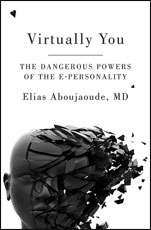"Whether we go online to learn, find love, shop, play virtual games, diagnose ourselves, connect with friends and loved ones, or read our favorite blogs, the Internet sucks up a shockingly large amount of time — over forty-five days per year in some urban centers, according to some estimates. The consequences of spending too much time in the virtual world are sometimes no less serious than those associated with a mental illness or substance abuse problem. This has given rise in the media, and among some mental health professionals, to a new concept — 'Internet addiction.' The debate over whether it is an independent disease that deserves to be included in the DSM or simply a new manifestation of old conditions, such as pathological gambling and compulsive shopping, has created a split of sorts in the mental health community, eliciting some uncharacteristically strong reactions from psychiatrists, a normally placid bunch. Add to the problem of classifying Internet addiction the uncertainty about how to treat it, and you get a controversy that rivals the one surrounding multiple personality disorder, and echoes of the 'hysterical response to hysteria.'
"There is no shortage of opportunities to waste time online. Many of us have had the experience of going in search of a specific piece of information only to fall down the rabbit hole and find ourselves, an hour later, reading something entirely unrelated to our original search. Our browsing trajectory is, almost by definition, tangential, even when we approach Google knowing exactly what we want. So intent are we sometimes on not wasting time, on finding something specific, that we take advantage of a Google 'advanced search' feature. By bracketing our search phrase with quotation marks, we can make sure we retrieve only exact instances of that phrase. Entering '2010 Oscar nominees,' for example, as opposed to the quoteless 2010 Oscar nominees, should, technically, avoid related results like Oscar betting games, best Oscar acceptance speeches, and Netflix. In reality, however, this specificity-enhancing feature hardly narrows things down enough, as pictures of worst-ever Oscar fashions from years past and self-assured predictions of this year's winners still manage to pop up, diverting us from the task at hand. Despite our best intentions, eye-catching finds along the way always derail us online, so that a well-circumscribed search bifurcates and trifurcates in a manner that is guaranteed to yield much more, or much less, than our original aim. 'Advanced' search option or not, a simple Internet search is never that simple, and before we know it, we have spent too much time browsing. Perform a dozen such searches a night and your spouse might start calling you an Internet addict, and some experts might agree.
"Much conspires online to make any attempt at focusing almost futile. Resisting reading or answering personal e-mails at work is a challenge that most of us fail. How often does our in-box carry in it alerts that an out-of-stock item that we had expressed interest in is available again on Amazon, or that new status updates by our friends have been posted on Facebook since we last checked an hour before, or that new matches are waiting for us on Match as soon as we log in? Not to mention newsletters and blog feeds we subscribe to, and the waves of spam e-mail that most of us automatically delete — even that can be time-consuming — but that on occasion might steal our attention. All this adds up to real time, and, potentially, to a real waste of time, and we didn't even need to initiate a Google search to be thus diverted."
